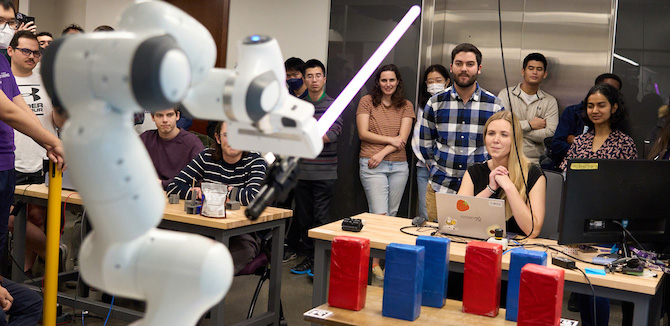First-Quarter MSR Students Complete Robotics Projects
A new MSR video highlights first-quarter students who created robots that play air hockey and Jenga, make hot chocolate, wield a lightsaber, and keep a balloon off the floor.
One of the most important courses in the curriculum for Northwestern Engineering's Master of Science in Robotics (MSR) program is Embedded Systems in Robotics. This project-based course is offered to students during their first quarter in the program and introduces them to the Robot Operating System (ROS).
Students also learn a range of skills they will use throughout their time in MSR, including computer vision, control, kinematics, localization, and path planning.
A new MSR video showcases students' final group project presentations in the Embedded Systems in Robotics experience class.
In the video, viewers are introduced to robots that make hot chocolate, help play Jenga, keep a balloon from hitting the floor, play air hockey, and knock blocks over using a lightsaber.
"I've never learned more than I have in this program," Megan Sindelar (MSR '23) said. "Because this program is so rigorous, you can't help but pick up an incredible amount of programming knowledge, software knowledge, and even hardware debugging knowledge."
MSR co-director Matthew Elwin, who taught the class, explained that the crash course in embedded systems is necessary to ensure students have the knowledge needed to excel during the rest of their time in the program. While some students come in having never programmed a robot before, they all leave the class having created an embedded system they can be proud of — even if it takes a lot of time to piece it all together.
"This course is one of the things that shows how the students are living, eating, breathing, and sleeping robotics," Elwin said.
While a robot that can make a warm drink or stop a flying puck may not sound like a useful application, the lessons learned through the process are essential — and will remain relevant throughout students' time in MSR and after they graduate.
"The types of problems that they're solving are the same types of problems that people in the driverless car industry have to solve," said MSR co-director Todd Murphey. "They're the same types of problems that people in the biomedical robotics industry have to solve."
Ava Zahedi (MSR '23), who helped program the hockey bot, said she appreciated the hands-on opportunity to start working with robotics as a first-quarter student. The fact that the program places such an emphasis on projects throughout the curriculum is one of the things that was most important to her in choosing MSR.
"If you actually care about learning robotics, and having projects under your belt and having new skills under your belt," she said, "then this is definitely the program for you."


